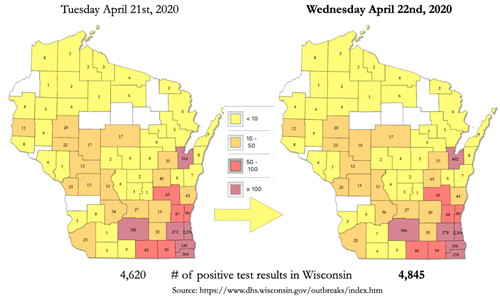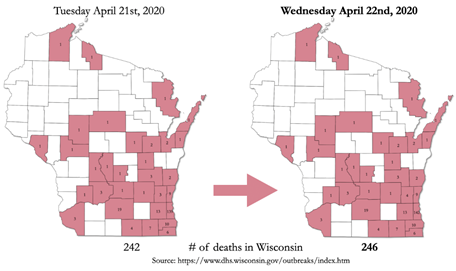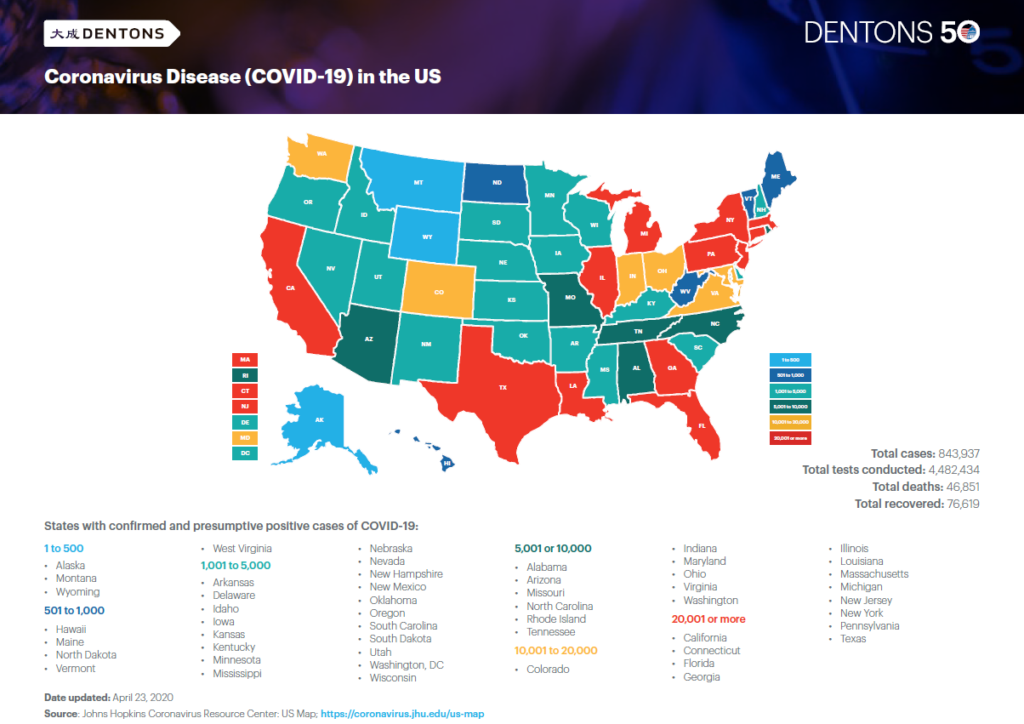
Alabama
As of April 23rd
The Alabama legislature will delay its return another week, with May 4 being the new date for the 2020 session to resume (see link below to news item). By law, the 2020 regular session cannot extend past May 18. Legislative leaders have stated their intent to have a narrowly-focused session with an agenda of budgets and a short list of other legislative items.
More specifically, and as reported in the news story, House Speaker Mac McCutcheon (R-Monrovia) released a statement today that read in part: “The Senate and House leadership have firmly agreed that state budgets and local bills will be the only matters discussed, debated, and voted upon in the remainder of the session…. The governor always has the option of calling us into a special session later in the year to address other issues of importance.” McCutcheon is holding a press conference today at 3 p.m. at the State House to further discuss these legislative developments.
A special session – or multiple special sessions – later this summer or fall are also very real possibilities, with issues such as broadband connectivity and criminal justice/prison reform among the most talked-about items.
Arkansas
As of April 22nd
Effective Monday April 27th, elective surgeries will resume. Only day surgery with no overnight stays. Patients must be tested for COVID-19 within 48 hours prior to surgery and be COVID symptom free, no underlying conditions and no contact with COVID-19 positive individuals.
Connecticut
As of April 23rd
Lamont administration initiates discussions with New York and New Jersey on a regional contact tracing strategy
The Lamont administration announced yesterday that it has initiated discussions with the governors of New York and New Jersey regarding a regional contact tracing strategy. New York Governor Andrew M. Cuomo announced a partnership with former New York City Mayor Michael Bloomberg through the Bloomberg Philanthropies. Governor Lamont expressed the need for a regional approach concerning contact tracing that complements existing staff, volunteers, processes, and technology as all of the states’ residents are in contact with each other on a regular basis, especially commuters in and out of New York City.
Data updates on COVID-19 testing in Connecticut
The following is a summary of the day-to-day newly reported data on cases, deaths, and tests in Connecticut. It is important to note that these newly reported updates include data that occurred over the last several days to a week.
| Overall Summary | Statewide Total | Change Since Yesterday |
| Laboratory-Confirmed COVID-19 Cases | 22,469 | +2,109 |
| COVID-19-Associated Deaths | 1,544 | +121 |
| Patients Currently Hospitalized with COVID-19 | 1,972 | +23 |
| Patients tested for COVID-19 | 69,918 | +5,726 |
Governor Lamont signs 31st executive order to mitigate the spread of COVID-19
Yesterday, Governor Lamont signed another executive order – the 31st since he enacted the emergency declarations. Executive Order No. 7DD enacts the following provisions:
- Additions to the definition of telehealth provider: Modifies state statutes to add any licensed dentist, behavioral analyst, genetic counselor, music therapist, art therapist, and veterinarian to the definition of telehealth provider.
- Flexibility for Medicaid-enrolled providers and in-network providers for commercial fully insured health insurance to perform telehealth through additional methods: Modifies Section 5 of Executive Order No. 7G regarding the delivery of telehealth with an updated definition and requirements for telehealth.
- Additions to permissible out-of-state healthcare providers: Modifies state statutes to additionally allow the commissioner of the Department of Public Health to issue an order to suspend, for a period not to exceed sixty consecutive days, the requirements for licensure, certification, or registration for occupational therapists; alcohol and drug counselors; radiographers, radiologic technologists, radiologist assistants, and nuclear medicine technologists; dentists; dental hygienists; behavioral analysts; genetic counselors; music therapists; art therapists; dietician-nutritionists; and speech and language pathologists.
- Participation in intern, resident physician, or United States Medical Officer candidate training programs prior to permit issuance: Modifies state statutes to allow a person to participate in an intern or resident physician program or United States Medical officer candidate training program prior to issuance of a permit by the Department of Public Health provided that the hospital administrator documents that the person has satisfied the requirements for such a permit set forth in the statute.
- Participation in resident physician assistant program prior to permit issuance: Modifies state statutes to allow a person to participate in a resident physician assistant program in a short-term hospital that provides a postgraduate medical education program accredited by the Accreditation Council for Graduate Medical Education, without a license or temporary permit or a training permit issued by the Department of Public Health, provided that the hospital administrator documents that the person is to be appointed a resident physician assistant in such hospital and has satisfied certain requirements.
- Temporary suspension of physician assistant supervision restrictions: Modifies state statutes to suspend the supervision requirements for physician assistants authorized to practice in the State of Connecticut.
- Temporary suspension of in-person supervision requirement for advanced practice registered nurses: Modifies state statutes to suspend the requirement that a physician, medically directing the prescriptive activity of an advanced practice registered nurse who is prescribing and administering medical therapeutics during surgery, must be physically present in the institution, clinic, or other setting where the surgery is being performed.
- Provision of services by respiratory care therapist and respiratory care technician students: Modifies state statutes to allow a respiratory care therapist student or a respiratory care technician student to provide services except that the services are not required to be a component of such person’s course of study.
- Suspension of continuing education requirement for health care providers: Suspends certain continuing education requirements for one year for occupations and professions with annual education requirements, and for other occupations and professions the continuing education completion period and reporting requirements are suspended for six months.
- Modification of 36-month age limit for Birth-to-Three services: Modifies state statutes to authorize the commissioner of the Office of Early Childhood to temporarily expand the definition of “eligible children” to include children who are receiving Birth-to-Three intervention services but reach the age where they would no longer be eligible.
Georgia
As of April 23rd
- Daily State Public Health stats: As of noon Thursday, State cases are up to 21,512 confirmed cases as compared to 21,102 at 7 p.m. Wednesday, with 4,069 hospitalized patients as compared to 4,018 last night, and 873 deaths as compared to 846 last night.
- IHME now predicts that Georgia reached our peak on April 15 and that relaxed social distancing may be able to start June 15.
- President Trump said Wednesday night that he disagreed strongly with some of Governor Kemp‘s reopening decisions.
- Top Georgia lawmakers are discussing resuming the state’s legislative session on June 11, after the coronavirus pandemic forced them to indefinitely suspend their work before they could adopt a spending plan for the next year. Duncan has also proposed a May 14 date.
- DPH is working on a new contact tracing program.
- Kia is now scheduled to bring back its 2,725 workers on May 4, due to continuing supply chain concerns.
- The Atlanta Community Food Bank is seeing a 30-40 percent in the number of people getting food from food drives and other emergency sources.
Local:
- The National Guard will now be hosting 4 additional metro testing sites. The sites are at the Decatur Armory in DeKalb County; Greenbriar Mall and Georgia State University in Fulton; and Kennesaw State University in Cobb County. Testing will be by appointment only; no walk-up testing will be allowed in order to protect workers. The KSU testing facility will operate daily, from 8 a.m. to noon and will be able to do 240 tests each day.
- Five metro governments will collectively receive more than US$614m in federal aid to help offset the costs of dealing with coronavirus. The amounts vary by population. The amounts are as follows:
- Gwinnett: US$163m from CARES, US$25.2 from five different federal grant programs
- Fulton: Roughly US$100m
- DeKalb: US$132.5m, hopes for an additional US$6.8m from other federal sources
- Atlanta: US$87m
- Cobb: US$132m per ACCG
Kansas
As of April 22nd
The Legislative Coordinating Council just adjourned its meeting. See our attached report for details. In short, the Legislature will not be returning on April 27 as originally planned, due to safety concerns. In accordance with what was decided today, the LCC will meet again on or before May 6 to determine a date when it is safe to return to conclude Legislative business for the Session.
Additionally, Kansas Governor Laura Kelly just released two additional Executive Orders today. They are listed below, with links to the signed Order.
- Executive Order No. 20-26, providing temporary relief from certain restrictions and requirements governing the provision of medical services.
- Executive Order No. 20-27, temporarily suspending certain rules relating to the sale of alcoholic beverages.
New York
Testing:
- Governor reiterated the need to test, trace and isolate and find those who test positive for antibodies so convalescent plasma can be donated
- Testing will help inform our infection rate and reopening strategy
- Sample size of 3,000 has been used
- More testing will be done in African-American and Latino communities in NYC
- Testing will begin in public housing developments today
- Will work with Rep. Jeffries and Velaquez to partner with churches and increase testing sites
Antibody Study:
- Today, Phase I results are available from 3,000 surveys collected over two days in 19 counties and 40 localities across the state.
- No one under age 18 was surveyed
- People are surveyed in grocery stores and other public locations
- 13.9 percent tested positive for having the antibodies
- Preliminary data shows that if infection rate is 13.9 percent , death rate may be lower than some estimates
- This means 2.7M infected statewide
- With approximate 15,5000 total fatalities (not considering in-home deaths), the death rate is about 0.5 percent of people infected
North Carolina
As of April 23rd
- Laboratory confirmed Coronavirus cases: 7,349
- Coronavirus deaths: 264
- Currently hospitalized: 434
- Completed tests: 90,336
- NC Counties affected: 93/100
- Realtime COVID-19 Data for NC
Update Highlights
The weekly average of new coronavirus cases in North Carolina has hit 300 per day, the highest so far in the pandemic. The rolling average of virus-related deaths also is at a high of 18 per day over the last week.
Governor Cooper has issued two new Executive Orders. He also stated that decisions regarding public schools (now closed through May 15) and an extension of the statewide Stay at Home Order (effective through April 29) would be made by the end of the week. Some state and local leaders said Wednesday they expect Governor Cooper to keep schools closed because social distancing will not be possible on campuses.
- Executive Order 133, Extending Transportation-Related Provisions in Earlier Executive Orders, April 20
- Executive Order 134, Business Flexibility to Make Payments to Assist Employees, April 20
Both Durham and Wake Counties modified their Stay at Home Orders. The Durham revision requires facemasks to be worn by the public and that employers make temperature checks of their employees. The Wake revised order includes mandatory employee temperature checks and asking employees about shortness of breath or respiratory issues. It also includes mandatory face masks for businesses (see below).
Mid-Week Update
The state Department of Health and Human Services reported 7,220 confirmed cases of COVID-19, up 269 from Tuesday’s total. The death toll in North Carolina reached 264 people, up 29 from Tuesday. This reflects a higher growth than as recently as Saturday, when new fatalities came in at a dozen.
The virus has proved especially fierce in congregate-living situations such as nursing homes and prisons. DHHS reported a total of 1,264 known cases of COVID-19 in nursing homes and residential care facilities in the state, and 109 deaths as of Wednesday. There are 40 outbreaks at nursing homes and 14 outbreaks at residential care facilities, according to DHHS.
Statewide, NC Department of Public Safety (DPS) has tested 723 inmates at its prisons and received 444 positive results. The highest volume of testing has come from Neuse Correctional in Goldsboro due to an outbreak there. More than 450 of Neuse’s 770 inmates have tested positive for COVID-19, making it one of the hardest-hit prisons in the nation. State officials are now testing every inmate there and results are pending. Twenty-two staff members at Neuse also have tested positive for the coronavirus. That has increased the staffing challenges at Neuse, which — like many state prisons — has wrestled with high officer vacancy rates. On Monday, prison officials announced that they temporarily closed Johnston Correctional Institution in Smithfield and are sending that prison’s employees to work at Neuse, 24 miles to the southeast.
The State Health Plan has obtained more than 20,000 coronavirus tests to be able to test more than 16,000 corrections officers and other employees at the state’s 56 prisons over the next few weeks.
Groups of business leaders are taking part in working groups assembled by Governor Cooper’s administration – three groups are addressing large events, restaurants and other businesses – to discuss how best to start reopening the state’s economy while maintaining social distancing and other guidelines to limit the spread of the coronavirus.
North Carolina has ordered US$280 million in personal protective gear from various sources but has obtained only 5 percent of it. The state has set up a system to vet potential vendors to ensure products are obtained from reliable sources.
After witnessing outbreaks at food processing plants in other states and receiving reports of cases among workers in the state, North Carolina public and private leaders have come together to take swift action to protect workers. The NC Department of Health and Human Services (NCDHHS), the NC Department of Agriculture and Consumer Services (NCDACS), local health departments, plant managers and corporate owners, community health centers and local hospitals are working together to keep workers safe and to help ensure the world’s food supply remains stable.
“Agriculture and agribusinesses are on the front lines of this crisis just like hospital workers, first responders, grocery store staff, truck drivers and many more. Their work is different, but every bit as critically important,” said Agriculture Commissioner Steve Troxler. “We are in contact with the companies, public health officials and our federal inspection partners. The companies are working to implement recommendations of the CDC and state public health and local officials to keep these facilities operating and producing a stable supply of safe and nutritious food.”
Following consultation with the National Institute of Occupational Safety and Health (NIOSH), NCDHHS and NCDACS developed interim guidance (see below) to help protect workers at food processing facilities. The interim guidance builds on previous CDC guidance for essential workers. It is not intended to replace any existing worker health and safety requirements of the US and North Carolina Departments of Labor.
Food processing plants report that they are doing temperature and symptom checks, encouraging sick employees to stay home and implementing paid sick leave for those with COVID-19 or suspected of having COVID-19. They are also providing personal protective equipment and employing social distancing policies where possible. Strike teams composed of staff from NCDHHS, NCDACS, NCDOL and local health departments and with virtual support from NIOSH will be available to conduct on-site assessments and providing technical assistance to plants to limit further spread.
With non-essential businesses closed and residents under a stay-home order through at least April 29, the state Department of Transportation said it will start a public-private partnership using drones to deliver food and medical supplies. In Holly Springs (Wake County), for example, the private drone service Flytrex will take meals from multiple restaurants into nearby neighborhoods. This is designed to make it easier for residents to stay home. “North Carolina has been a leader in demonstrating how drones can help people in times of crisis,” said State Transportation Secretary Eric Boyette in a news release. “We look forward to putting this technology into productive use.”
Five Republican state senators are asking Governor Cooper to allow NASCAR races, without fans, next month at Charlotte Motor Speedway. In a normal year, NASCAR would run the Coca-Cola 600 at the Charlotte track over Memorial Day weekend. Like other sports, NASCAR’s schedule has been upended by the coronavirus. NASCAR said it hopes to resume racing at some point in May without fans in the stands. Senators Kathy Harrington, Paul Newton, Todd Johnson, Vickie Sawyer and Carl Ford said allowing a race at Charlotte would require the governor to amend his executive order.
The House COVID-19 Response Committee, Economic Support met on Tuesday and proposed a few changes to the bill draft authorizing small business emergency loans. The revised bill differs from the previous version in (i) extending the maximum length of the loan term from 54 to 66 months, (ii) converting the eligibility criteria for recipients from a hard cap of fewer than 50 employees to a prioritization for 100 of fewer full-time equivalents, (iii) limiting the State repayment requirement to federal assistance received representing a duplication of benefits, (iv) increasing the appropriation from US$25M to US$75M (with the attendant matching funds requirement conforming change).
The House COVID-19 Response Committee, Continuity of State Operations also met Tuesday and discussed a draft bill that would make temporary changes to laws that affect a number of state operations and functions. This draft has been amended and will be presented to the committee again on Thursday for a final vote. See below for the Tuesday draft.
Executive Actions, Week of April 20th
- Executive Order 133, Extending Transportation-Related Provisions in Earlier Executive Orders, April 20
- Executive Order 134, Business Flexibility to Make Payments to Assist Employees, April 20
- NCDHHS Press Release, NC Leaders Act to Protect Food Processing Workers, April 21
- Recommendations for Food Processing Facilities
Legislative Actions, Week of April 20th
- Revised Bill Draft, Small Business Emergency Loans
- Revised Bill Summary: Small Business Emergency Loans
- Bill Draft, COVID-19 Time Sensitive Matters
North Carolina Agencies/Programs
- Agriculture
- Attorney General
- Price gouging complaint form
- Board of Funeral Service
- Community Colleges
- Courts
- Elections
- Health and Human Services
- Application for emergency childcare financial assistance
- Housing Finance Agency
- Human Resources
- North Carolina Association of County Commissioners
- Parks
- Public Assistance Grants (Dept. of Public Safety)
- Public Instruction
- Remote learning resources
- Revenue
- Application to be considered an “essential business”
- Taxpayer penalty relief
- Small Business Resource Portal (NC Chamber)
- Transportation
- UNC School of Government
- Local government issues
- UNC System
- Unemployment Insurance
- Utilities Commission
- Wildlife Resources Commission
Local Government Actions
- Pitt County Stay at Home Order, March 23
- Graham County and Municipalities Non-Resident Access Permit & Curfew, March 23
- Town of Beaufort Stay at Home Order, March 23
- Brunswick County State of Emergency, March 24
- Columbus County State of Emergency, March 24
- Mecklenburg County and Municipalities Stay at Home Order, March 24
- City of Durham Stay at Home Order, March 25
- 3rd Amendment to Durham County Stay at Home Order
- Greensboro, Guilford County, High Point Stay at Home Order, March 25
- Buncombe County Stay at Home Order, March 26
- Cabarrus County and Municipalities Stay at Home Order, March 26
- Gaston County and Municipalities Stay at Home Order, March 26
- Haywood County Stay at Home Order, March 26
- Wake County and Municipalities Stay at Home Order, March 26
- Wake County First Amendment to Stay at Home Order
- City of Winston-Salem Stay at Home Order, March 26
- Village of Clemmons Shelter in Place Order, March 26
- City of Lexington Stay at Home Order and Curfew, March 27
- Madison County and Municipalities Stay at Home Order, March 27
- Rutherford County and Municipalities Stay at Home Order, March 27
- New Hanover County State of Emergency, March 28
- Watauga County and Municipalities State of Emergency, March 30
- City of Fayetteville State of Emergency and Curfew, March 31st
- Henderson County and Municipalities Stay at Home Order, March 31
Wisconsin
As of April 22nd
Wednesday Media Briefing:
In a change from the regular media briefing participants of Wisconsin Governor Tony Evers, Department of Health Services (DHS) Secretary-designee Andrea Palm, DHS Chief Medical Officer Dr. Ryan Westergaard, and Ryan Nilsestuen, Chief Legal Counsel, the briefing today was conducted by DHS Deputy Secretary Julie Willems Van Dijk and Maj. Gen. Paul Knapp, Wisconsin’s Adjutant General and Commander of the Wisconsin National Guard. The briefing was conducted from and highlighted the work being done by the State Emergency Operations Center and their public and private sector partners.
Of note in the briefing were the following points:
- General Knapp was asked if the National Guard will have a role in the protest of the Governor’s Safer-At-Home extension that is scheduled for Friday on the capitol square. The protesters were denied a permit by the State of Wisconsin earlier in the day. General Knapp responded that the Guard as of yet has not been asked nor been tasked with a role.
- Gen. Knapp was asked how many members of the Wisconsin National Guard are currently involved in the state’s response to COVID-19 and he said there were about 1,000 or 10 percent of the citizen soldier members of the Guard.
- Gen. Knapp was asked if any of the soldiers participating in Election Day activities contracted the COVID-19 virus, and he responded that 5 National Guard members reported symptoms that consistent with COVID-19, however only one was tested and that soldier tested negative for COVID-19.
- Deputy Secretary Julie Willems Van Dijk was asked about any updates on potential positive cases associated with in-person voting on an election day. Willems Van Dijk responded there were 15 individuals who voted in person or worked the polls on Election Day who have tested, but noted that they cannot say that voting in person or working a poll caused them to contract the virus.
- Willems Van Dijk was asked about the state’s two alternate care sites (State Fair Park in Milwaukee and the Alliant Energy Center in Madison) and what their status is and whether they will be necessary. She responded that the Milwaukee site is nearly ready and the Madison site is still in the planning stage. She said their models suggested that we could exceed hospital bed capacity, so in the event that happens, those facilities will stand ready to accept patients. She said they are close to having the necessary volunteer providers in Milwaukee, and that they have been doing a great job on getting the necessary volunteers.
The entire YouTube Live briefing can be found here.
Governor Evers responds to Republican Lawsuit:
Late on Tuesday, Governor Tony Evers responded to Republican Legislative Leaders asking the Wisconsin State Supreme Court to intervene on the extension of the Safer-At-Home order issued by Department of Health Services Secretary-designee Andrea Palm:
Republicans are exploiting a global pandemic to further their attempts to undermine the will of the people. But what’s at stake goes far beyond political power–lives are on the line.
Today, Republicans in the Legislature filed a lawsuit to effectively strike down our #SaferAtHome order and cripple our ability to respond to a pandemic that has already taken the lives of 242 people in our state.
This isn’t a game. This isn’t funny. People die every day because of this virus — often times painful and lonely deaths — and the more we delay or play political games the more people die.
We’ve seen what happens in communities that don’t contain this virus through isolation measures like we have with #SaferAtHome. Look at Italy. Look at Spain.
Read the reports of doctors rationing ventilators and having to choose which patients will live or die. Read the reports of needing refrigeration trucks for the deceased, or even worse, being left at home for days because the morgue is overcrowded.
This is why we took bold action with our Safer at Home plan to keep Wisconsinites safe and healthy. It’s working. We have flattened the curve here in Wisconsin and have prevented the death of at least 300 Wisconsinites, and perhaps as many as 1400 lives.
Today legislative Republicans told the 4,600+ people in the state of Wisconsin who have contracted COVID-19 and the families of the 242 people who have died, we don’t care about you — we care about our political power.
Their lawsuit doesn’t mention saving lives. It doesn’t mention protecting our nurses, doctors, first responders, and critical workers. Instead it’s 80 pages of a lawsuit focused entirely on how to get legislative Republicans more power.
Apparently, instead of having us act quickly and decisively to respond to a crisis, Republicans would rather have us jump through hoop after hoop and ask for their permission to save lives. Folks, we don’t have time. COVID-19 will not wait.
Today’s action by legislative Republicans during a crisis is a shameful response by people elected to protect and serve the people of our state. It is a disservice to those we represent, those who are struggling in this crisis, and the economy we will need to rebuild together.
Wisconsin is a place for kindness, compassion, empathy, and respect, and today, Republicans have shown that even in the midst of a global pandemic, these values are beyond them.
(Link to Facebook Page)
Other COVID-19 Items of Note:
- Brown County now has the 2nd highest amount of positive tests in the state now, eclipsing Dane county. WBAY in Green Bay is reporting that Brown County Public Health said 147 of their COVID-19 cases have been linked to an outbreak at the JBS beef facility in Green Bay.
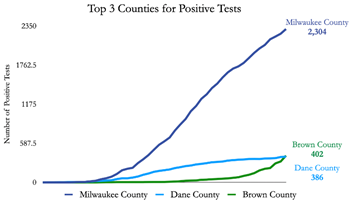
- Organizers of a protest scheduled to take place at 1:00 PM on Friday on the Capitol Square said their event will continue on, despite being denied a permit by the Department of Administration. According to the organizer, no politicians were invited to speak, instead speakers will include a doctor, nurse, farmers and small business owners. (Associated Press story)
Updated numbers released on Wednesday:
The Wisconsin Department of Health Services and the Wisconsin Hospital Association released updated numbers on Wednesday, of note are the following:
- 49,502 negative test results (cumulative)
- +1,661 over reported on Tuesday
- 4,845 positive test results (cumulative)
- +225 over reported on Tuesday
- 246 deaths (cumulative)
- +4 over reported on Tuesday
- 352 Current Hospital Admissions (137 patients in ICU)
- Hospital admissions are -6 in admissions since Tuesday (ICU patients remained the same)
Sources:
Wisconsin Hospital Association (WHA) COVID-19 Situational Awareness Update site
DHS COVID-19: County Data; https://www.dhs.wisconsin.gov/covid-19/county.htm
Daily Numbers:
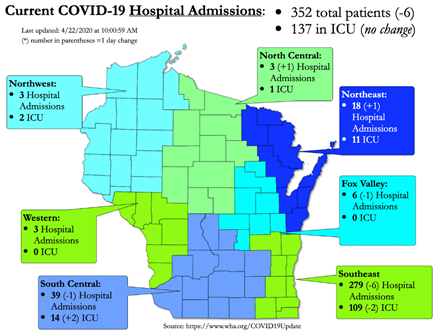
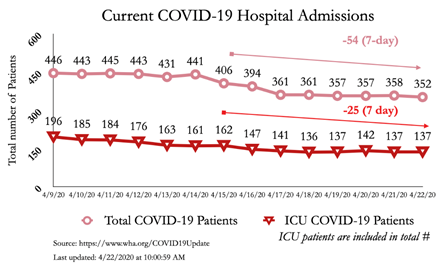
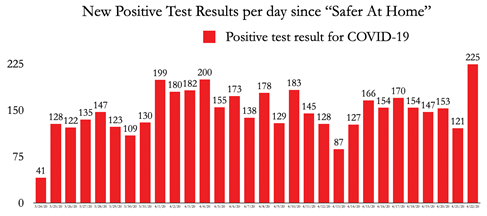
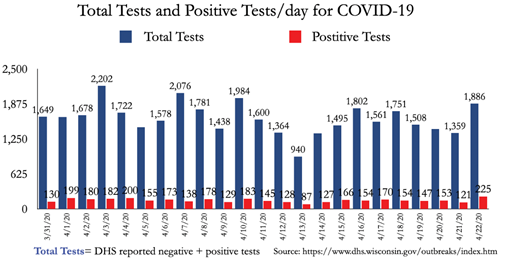
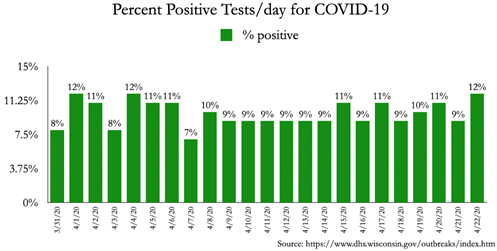
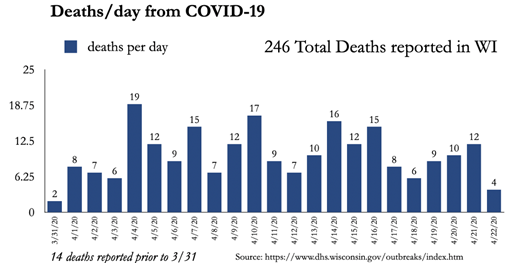
Cumulative Numbers:
